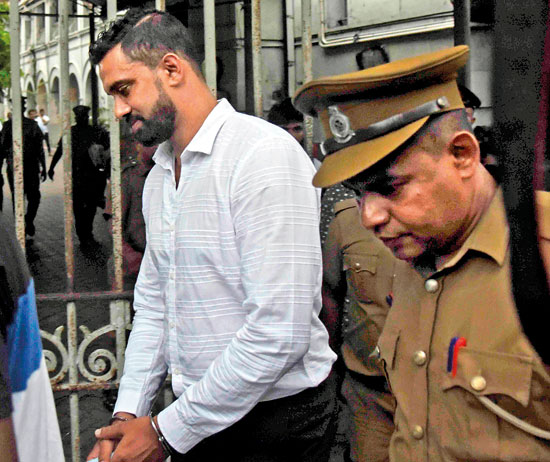Infamous ‘Mankader’ Sachithra first cricketer indicted under sports corruption law; ‘Shahidi’ identified

Sachithra Senanayake
In a landmark move, the country’s Attorney General’s (AG’s) Department this week indicted former international cricketer Sachithra Senanayake for his role in a match-fixing scandal during the inaugural Lanka Premier League (LPL) in 2020, while investigations continue on a second complaint against the same accused.
Senanayake, who was part of the 2014 T20 World Cup winning team, faces formal charges (Case No. CR801/2021 A) in the Hambantota High Court after being accused of violating Section 5(c) of the Prevention of Offences Relating to Sports Act (Act No. 24 of 2019).
Section 5(c) of the Act states that “any person or any person connected to a sport who solicits, entices, persuades, induces or instructs any person directly or indirectly to perform or refrain from performing an act, to influence the result, progress, conduct or any other aspect of any sport or sporting event commits the offence of corruption in sports.”
The case will be called on July 9 for the service of the indictment to the accused cricketer at the High Court. The case emerged following a complaint lodged by first-class cricketer Konganige Tharindu Sasanka Rathnayake, who reported Senanayake’s alleged attempts to influence him to underperform during the LPL.
Following Rathnayake’s complaint, former Sri Lanka seamer Dhammika Prasad also made a complaint. The AG’s department has instructed the Special Investigation Unit (SIU) of the Ministry of Sports to further investigate the complaint made by Prasad and report back in order to take the next course of action.
Meanwhile, SIU sources revealed they have identified the individual known as ‘Shaidi’—an Indian national who served as CEO of the Dambulla Viiking team.
“We have identified the person and he will be named a suspect,” sources from the SIU confirmed.
State Counsel Akila Dalpadado filed the indictment under the advice of Additional Solicitor General Sumathi Dharmawardena, who is the Sports Law Supervisor of the AG’s Department and also the Independent Chair for the International Cricket Council’s Anti-Corruption Unit (ACU).
The indictment alleges that between November 21 and 22, 2020, within the jurisdictional limits of Murusi Island (Mauritius) and Hambantota, Senanayake engaged in activities designed to influence match outcomes during the LPL tournament.
According to the indictment, Senanayake either directly or through the intermediary ‘Shaidi’ communicated corrupt proposals to the player. The intercepted message allegedly stated: “Already spoke to the management. You will get games. And you have to give something for them too. OK.”
Senanayake had then advised Rathnayake not to inform the ICC Anti-Corruption Unit about a proposal made by ‘Shaidi’ to fix matches for the Colombo Kings during the said tournament, the indictment further stated.
Following the allegations, the Anti-Corruption Unit of the International Cricket Council (ICC), headed by Alex Marshall, requested Sri Lankan authorities to pursue the matter to maintain the sport’s integrity.
Digital evidence played a major role in building the case, with investigators revealing that WhatsApp communications were allegedly used to contact players and coordinate corrupt activities. A voice test was conducted to match Senanayake’s voice with recordings as part of the evidence-gathering process.
The allegations have cast a shadow over what was previously a distinguished cricket career. Senanayake represented Sri Lanka in 74 international matches across all formats and was a key member of the team that won the T20 World Cup in 2014, one of Sri Lankan cricket’s proudest moments. His contributions as an off-spinner made him a recognised figure in both domestic and international cricket circles.
The Prevention of Offences Relating to Sports Act, enacted in 2019, represents Sri Lanka’s robust legal response to sporting corruption, carrying severe penalties including up to 10 years’ imprisonment, fines reaching Rs. 100 million, or both. The law’s comprehensive scope covers any attempt to influence sporting events, whether through direct participation or as an accomplice.
Senanayake is currently out on bail whilst the legal process unfolds. The case highlights the effectiveness of whistleblowing mechanisms, with fellow cricketers playing crucial roles in exposing alleged corruption, demonstrating the importance of creating safe channels for athletes to report suspicious activities without fear of retribution.


